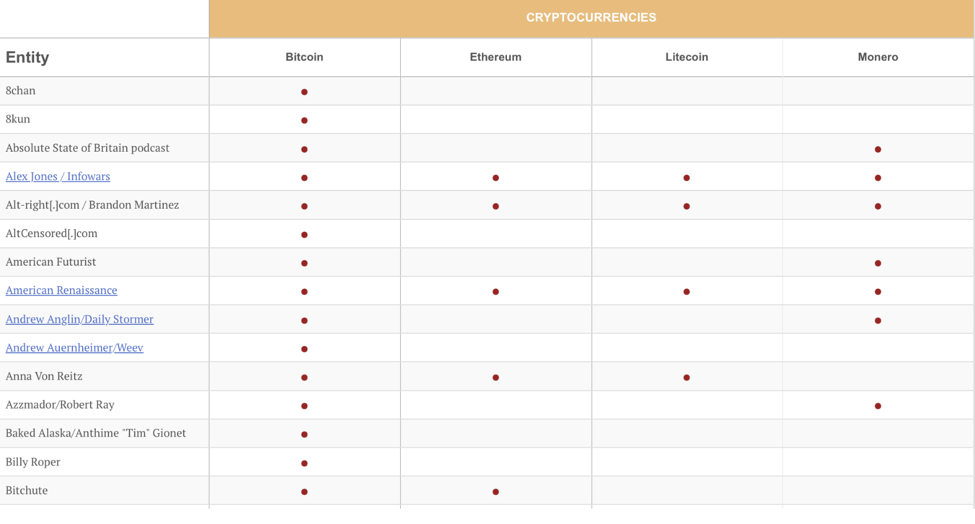Join Our Telegram channel to stay up to date on breaking news coverage
As cryptocurrencies gain momentum in Europe, the impact of right-wing ideologies has become apparent, with politicians and extremist groups embracing digital currencies. Recognizing the profound implications of this trend, it becomes paramount to foster an environment that promotes inclusivity, transparency, and the preservation of democratic principles in the crypto space.
Examining Right-Wing Influence in European Crypto Markets
In recent years, there has been a notable surge in the European crypto landscape, with growing interest and adoption of cryptocurrencies and blockchain technology. While these advancements are commonly linked with decentralization, innovation, and financial autonomy, they are not impervious to the sway of political ideologies, including those of right-wing movements.
Right-wing politicians in Europe are attracted to cryptocurrencies for several reasons. Right-wing ideologies prioritize individual freedoms and limited government intervention, and cryptocurrencies align with these principles.
The inherent decentralization of cryptocurrencies presents an opportunity for individuals to attain financial autonomy, granting them the ability to exercise control over their funds independently of conventional financial systems and governmental regulations.
Additionally, right-wing politicians see cryptocurrencies as a way to challenge the existing financial establishment and its perceived biases.
Bitcoin, in particular, emerged after the 2008 financial crisis, which eroded trust in traditional financial institutions and governmental monetary policies. The decentralized nature of Bitcoin appeals to those who advocate for alternative monetary systems outside of central bank control.
Germany’s Alternative for Germany (AfD) party serves as an illustration of right-wing politicians embracing cryptocurrencies. Although the party lacks a formal cryptocurrency strategy, certain members, such as AfD leader Alice Weidel, have demonstrated a favorable stance towards Bitcoin.
Weidel has attended Bitcoin conferences and has even referred to herself as a “Bitcoin entrepreneur.” The AfD has also utilized parliamentary procedures, submitting inquiries to the government regarding crypto donations for Ukraine and opposing a proposed Bitcoin ban in European discussions.
Cryptocurrencies and blockchain technology have not only attracted right-wing politicians but have also been a topic of concern among scholars. Some experts warn that blockchain technology could be co-opted by right-wing and libertarian groups seeking a world without government control.
The association between cryptocurrencies and right-wing ideologies is evident in instances like Weidel’s affiliation with the Hayek Society, named after economist Friedrich August von Hayek, a proponent of minimal government intervention in the market.
While the European crypto scene is not inherently right-wing, it is important to address concerns regarding right-wing influence in the community. Education, regulations, and inclusivity are vital to fostering an environment that remains transparent, aligned with democratic principles, and promotes constructive dialogue.
Platforms and online communities must actively combat hate speech, misinformation, and extremist content to ensure that the crypto space remains a safe and productive realm for all participants.
Right-Wing Politicians Embrace Bitcoin and Blockchain
Bitcoin and blockchain technology have garnered attention from not only right-wing politicians in Germany but also leaders of right-wing parties in the Netherlands, such as Geert Wilders from the Party for Freedom (PVV) and Thierry Baudet from the Forum for Democracy (FvD).
These Dutch politicians have shown a favorable stance towards the potential disruptive power of Bitcoin and blockchain in traditional financial systems.
Baudet aims to make the Netherlands a Bitcoin hub and has launched NFT series opposing Klaus Schwab, the CEO of the World Economic Forum (WEF), due to his concerns about the WEF’s impact on individual freedom.
During his time in the ruling United Right coalition, Jaroslaw Gowin, the leader of Poland’s Agreement party, expressed support for cryptocurrencies. As deputy prime minister and member of parliament, Gowin actively sought input from industry experts, including economist Krzysztof Piech and Filip Pawczynski, president of the Polish Bitcoin Association.
Nigel Farage, a prominent British politician and former leader of the pro-Brexit UK Independence Party, has shown interest in cryptocurrencies. In a 2022 interview with Cointelegraph, Farage, a former member of the European Parliament, expressed early awareness of Bitcoin and its potential adoption in Europe.
He emphasized transformative changes, calling Bitcoin a trusted means of exchange and criticizing the existing financial infrastructure for its inefficiency, high costs, and slow speeds.
The Hungarian Prime Minister Viktor Orbán, who leads the right-wing Fidesz party, and his government are currently exploring the potential benefits of launching a central bank digital currency. Their efforts reflect a growing interest in harnessing the advantages of digital currencies within right-wing circles.
Hungary has also shown an inclination towards crypto more broadly, with plans unveiled in 2021 to reduce taxes on crypto trading as part of an economic recovery program, signaling a growing openness towards cryptocurrencies within the country.
Crypto, Right-Wing Movements, and Extremist Groups
Cryptocurrencies have gained traction among both right-wing politicians and extremist movements sharing similar ideologies. The Middle East Media Research Institute (MEMRI) released a report in 2022, shedding light on the notable increase in the adoption of digital currencies for transactions within right-wing extremist groups in recent times.
According to MEMRI, ultranationalist and European extremist groups that advocate for a “white” Europe and North America and proclaim the superiority of the “white race” have been early adopters of crypto. They began accepting BTC donations as early as 2012.
The Southern Poverty Law Center, based in the United States, has compiled a list of extremist groups that accept crypto donations.
Ultranationalist and extremist groups actively utilize cryptocurrencies not only due to convenience and their ideological alignment but also because traditional and mainstream online banking systems often exclude them. Moreover, funds held in crypto cannot be accessed or seized by any entity.
However, it would be incorrect to label crypto in Europe as exclusively a right-wing phenomenon. While cryptocurrencies themselves are politically neutral, they are not devoid of ideology and can indirectly hold political positions.
Cryptocurrencies garner varying opinions among politicians of different persuasions, and endorsing digital currencies is not exclusive to those with right-leaning ideologies. The Free Democratic Party in Germany, recognized for its pro-free market position, also champions policies that favor the adoption and advancement of cryptocurrencies.
The European crypto scene is not inherently right-wing, but the MEMRI report acknowledges right-wing influence. It emphasizes the need for education, regulations, and promoting inclusivity, transparency, and democratic principles in the crypto space.
MEMRI further asserts that proactive measures must be taken by social media platforms and online communities to combat hate speech, misinformation, and extremist content. Simultaneously, they should encourage healthy and constructive dialogue.
Related
Best Wallet - Diversify Your Crypto Portfolio
- Easy to Use, Feature-Driven Crypto Wallet
- Get Early Access to Upcoming Token ICOs
- Multi-Chain, Multi-Wallet, Non-Custodial
- Now On App Store, Google Play
- Stake To Earn Native Token $BEST
- 250,000+ Monthly Active Users
Join Our Telegram channel to stay up to date on breaking news coverage




